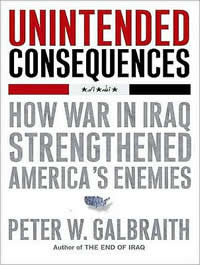Book Notes
 Peter W. Galbraith, Unintended Consequences; How War in Iraq Strengthened America's Enemies (New York: Simon and Schuster, 2008), 203pp.
Peter W. Galbraith, Unintended Consequences; How War in Iraq Strengthened America's Enemies (New York: Simon and Schuster, 2008), 203pp.
In its ignorance, incompetence, deceit, and fervent ideology, Peter Galbraith is the sort of career foreign diplomat that the Bush administration willfully ignored when it invaded Iraq. Since graduating from Harvard, Oxford, and Georgetown, Galbraith has spent three decades in government service, most notably as America's first ambassador to Croatia and a United Nations diplomat in East Timor. He's been an adjunct professor and lecturer at the National War College (1999 and 2001-2003). His earlier book The End of Iraq (2007) received wide-spread acclaim for its analysis based upon Galbraith's decades of experience in Iraq.
Despite what the Bush administration told the public about its rationale for a war of choice, we now know that Iraq did not possess WMDs, Saddam Hussein was not involved in the 9/11 attacks, and Iraq was not a base for al-Qaeda (although it became one after the war started). The later justification of producing a democratic Iraq has failed miserably. In fact, on almost every count, Bush's war produced the opposite results of those he intended.
Whereas Iraq did not have WMDs, North Korea, Iran and Pakistan have grown as genuine nuclear threats. The "war of terror" has emboldened terrorists and swelled the ranks of their recruits. The agenda of a free democracy "now has US troops fighting for pro-Iranian Shiite theocrats [the government] and alongside unreformed Baathists [the Sunni Awakening]." The attempt to marginalize Iran has made its influence in Iraq stronger than it has been in four hundred years. Syria is now more bold, not more threatened, and Israel is less rather than more secure. Turkey has been transformed from one of America's biggest supporters to a nation of virulent anti-Americanism. The "shock and awe" of American superiority has revealed gross failures of intelligence, planning, and politics. American prestige has been squandered, five million Iraqis have been displaced and at least 100,000 killed, the Republican party decimated, and our own country floundering. When he left office in January 2009, Bush did not concede that he had made any mistakes.
In Galbraith's analysis, the central problem in Iraq rests in the deep divisions between and among Shiites, Sunnis, Kurds, and even those who remember a good life as secular Iraqis. These groups, says Galbraith, have "irreconcilable differences" and are merely "biding their time" until the next civil war. The army and police are highly sectarian. There are few mixed neighborhoods anymore. Kurds will never agree to be integrated in a centralized and unified Iraq (nor should they, in Galbraith's view). In short, as he argued in his first book, reality dictates that there never will or can be a unified Iraq.
President Obama intends to remove most American troops by 2010, but in his book The Gamble (2009), Thomas Ricks quotes sources that envision American troops in Iraq until 2015, in which case we are only at the halfway point of America's greatest foreign policy blunder ever. Even more ominous, says Ricks, "the events for which the Iraq war will be remembered probably have not yet happened." And that is the cause for which George Bush squandered American lives, money, and global prestige.


